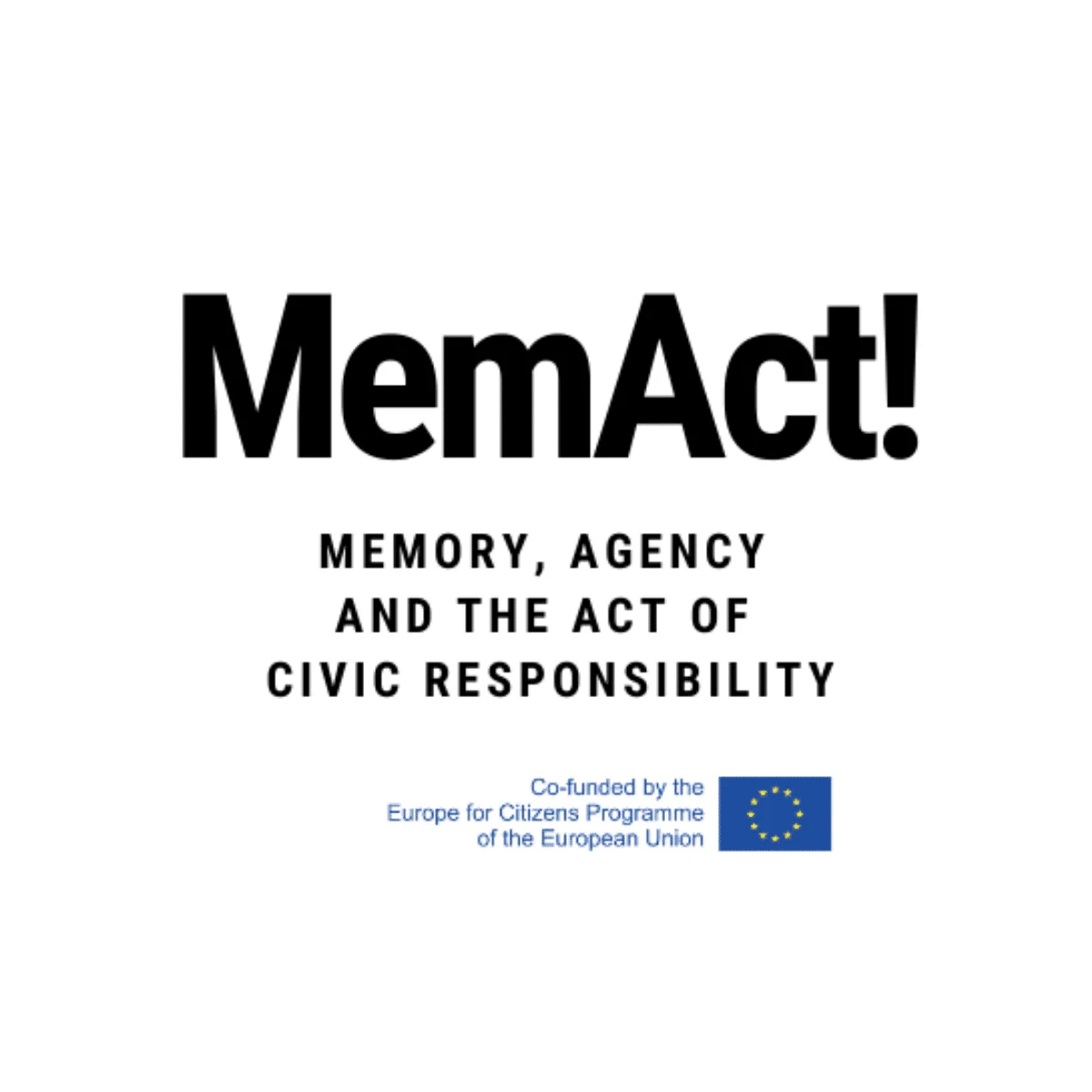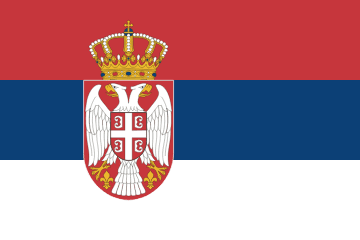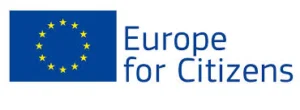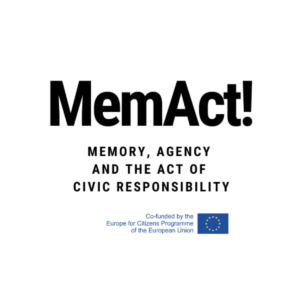
MEMACT
MemAct! evaluates, develops and implements best practices participatory methods to learn about the Holocaust. MemAct! brings together educators, researchers and activists from different fields of Holocaust learning, civic education and community work against racism and anti-Semitism. MemAct! evaluates, develops and implements best practices participatory methods to learn about the Holocaust. They aim to enable communities to connect the past with current societal issues e.g. new anti-Semitism, anti-migrant Racism and other forms of exclusion. Recent disturbing events such as the Halle synagogue shooting remind us on the immediate need of a turn towards a civic education approach in Holocaust education.
MemAct!’s aim is to head for a cross-European perspective in Holocaust education
MemAct! evaluates, develops and implements best practices participatory methods to learn about the Holocaust.
MemAct! brings together educators, researchers and activists from different fields of Holocaust learning, civic education and community work against racism and anti-Semitism.
MemAct! evaluates, develops and implements best practices participatory methods to learn about the Holocaust. They aim to enable communities to connect the past with current societal issues e.g. new anti-Semitism, anti-migrant Racism and other forms of exclusion. Recent disturbing events such as the Halle synagogue shooting remind us on the immediate need of a turn towards a civic education approach in Holocaust education.
Duration: 02. November 2020. – 01. May 2022.
Terraforming in the MemAct! project
Program 1:
Cooperation of future teachers from Serbia and Austria
University of Education Upper Austria, Faculty of Pedagogy from Sombor and Terraforming will develop a Holocaust lesson model (prototype) of how to address the shared but divided history of Austria and the Balkan region. Together with young apprentices and students from Austria and Serbia work on the model and test it with students of the University of Education Upper Austria.
Program 2:
Places of Remembrance Hartheim and „Staro Sajmište“
Terraforming, Hartheim & NORDICO will explore how visits of memorial sites, authentic historic sites and their contemporary urban/rural surroundings can be connected. Project will include young people in developing methods to foster a deeper understanding of the impact of local histories of the Holocaust in todays’ neighborhoods. The concentration camp „Judenlager Semlin“ at Sajmište and the town of Belgrade will serve as a testing ground.
About the Project
By exchanging examples of best practice in Holocaust education, MemAct! team develops participatory models and concepts of education and dialogue on the memory of suffering and crimes in the Second World War. In the MemAct! educational models to be developed, citizens with diverse backgrounds will be encouraged to define their own meaningful questions on the Nazi past and connect them with challenges of our current Europe to approach the ethics of civic responsibility. In addition, educators will learn from the way various participating communities, youth, elderly people, migrants and disadvantaged people perceive history. Through these shared processes, MemAct! will also develop models of collaboration between Holocaust education and anti-racist community work.
The general aim of MemAct! is to challenge and change approaches in commemoration site and museum activities towards a participatory approach. As the problem of the rise of extreme right thinking patterns and attitudes – that once made the Holocaust possible – is of a common Europe concern, MemAct!’s aim is to head for a cross-European perspective in Holocaust education, including too often neglected voices from East – and South East Europe.
To head in this direction the specific aim of MemAct! is the development, the implementation and dissemination of participatory and democratic methods, models, learning settings in museum, commemoration sites, teacher training and schools.Through the project activities MemAct! aims to build a network between educators and activists in the field of Holocaust education and civic education in a European perspective: Museum or commemoration site employees will learn form NGOs in the field of remembrance activism and anti-racist practices and vice versa. MemAct! will contribute guidelines and strategies for participatory perspectives in Holocaust education. They will be provided to local, national and EU policy makers. Hence MemAct! develops and provides the necessary tools to find educational answers on pressing European challenges and perils regarding the rise of anti-Semitism, anti migrant, anti Roma Racism, and separatism.
Museen der Stadt Linz is the principal partner in the project
The LENTOS Kunstmuseum Linz has been operational, together with the Municipal Museum NORDICO, since its opening in 2003 within the framework of the Museen der Stadt Linz, the museums of the City of Linz. Since 1 January 2018, the museums of the City of Linz have been given the form of an autonomous LLC as a 100 % subsidiary of the Kreativität, Kultur & Veranstaltungen der Stadt Linz Holding GmbH.
With their different institutions – the LENTOS Kunstmuseum, the NORDICO Stadtmuseum and the VALIE EXPORT Center Linz (a cooperation with the University of Arts and Industrial Design Linz) – the museums of the City of Linz are among the city’s most potent cultural driving forces and see themselves as meeting places designed for dialogue. The Museen der Stadt Linz are managed by Hemma Schmutz as Artistic Director and Gernot Barounig as Commercial Director. They have a staff of roughly 35 employees (on a full-time equivalent basis) and an annual budget of approximately 4.5 million Euro.
The project is realized with the support of
Program Europe for Citizens: European Remembrance
Under the overall aim of bringing the Union closer to citizens the general objectives are: to contribute to citizens’ understanding of the Union, its history and diversity; to foster European citizenship and to improve conditions for civic and democratic participation at Union level. In line with the general and specific objectives of the Programme, annual priorities are defined by the European Commission after consultation of the Programme Committee. Applicants are encouraged to develop projects in line with the objectives of the Programme and targeting the annual priorities.






